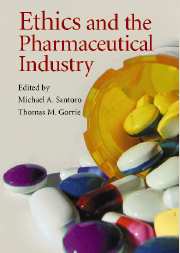Book contents
- Frontmatter
- Contents
- Tables
- Figures
- About the Editors
- Contributors
- Preface
- Acknowledgments
- Foreword
- Introduction: Charting a Sustainable Path for the Twenty-First Century Pharmaceutical Industry
- PART I PROFITS, PATIENTS' RIGHTS, AND SCIENTIFIC PROGRESS: THE ETHICS OF CLINICAL RESEARCH CONDUCTED IN PRIVATE ENTERPRISES
- PART II MARKETING AND THE EFFICIENT UTILIZATION OF HEALTHCARE RESOURCES: ETHICAL AND PUBLIC POLICY CHALLENGES
- Introduction to Part II
- 8 Ethics and Prescribing: The Clinician's Perspective
- 9 The Regulation of Prescription Drug Promotion
- 10 Direct-to-Consumer Advertising of Prescription Drugs: A Policy Dilemma
- 11 Off-Label Communications and Prescription Drugs
- 12 The Need for Better Health Information: Advancing the Informed Patient in Europe
- 13 Who Should Get Access to Which Drugs? An Ethical Template for Pharmacy Benefits
- 14 The Application of Cost-Effectiveness and Cost–Benefit Analysis to Pharmaceuticals
- PART III PATENTS, PRICING, AND EQUAL ACCESS
- PART IV CONCLUDING THOUGHTS: CHARTING A SUSTAINABLE PATH FOR THE TWENTY-FIRST CENTURY
- Notes
- Index
8 - Ethics and Prescribing: The Clinician's Perspective
Published online by Cambridge University Press: 04 December 2009
- Frontmatter
- Contents
- Tables
- Figures
- About the Editors
- Contributors
- Preface
- Acknowledgments
- Foreword
- Introduction: Charting a Sustainable Path for the Twenty-First Century Pharmaceutical Industry
- PART I PROFITS, PATIENTS' RIGHTS, AND SCIENTIFIC PROGRESS: THE ETHICS OF CLINICAL RESEARCH CONDUCTED IN PRIVATE ENTERPRISES
- PART II MARKETING AND THE EFFICIENT UTILIZATION OF HEALTHCARE RESOURCES: ETHICAL AND PUBLIC POLICY CHALLENGES
- Introduction to Part II
- 8 Ethics and Prescribing: The Clinician's Perspective
- 9 The Regulation of Prescription Drug Promotion
- 10 Direct-to-Consumer Advertising of Prescription Drugs: A Policy Dilemma
- 11 Off-Label Communications and Prescription Drugs
- 12 The Need for Better Health Information: Advancing the Informed Patient in Europe
- 13 Who Should Get Access to Which Drugs? An Ethical Template for Pharmacy Benefits
- 14 The Application of Cost-Effectiveness and Cost–Benefit Analysis to Pharmaceuticals
- PART III PATENTS, PRICING, AND EQUAL ACCESS
- PART IV CONCLUDING THOUGHTS: CHARTING A SUSTAINABLE PATH FOR THE TWENTY-FIRST CENTURY
- Notes
- Index
Summary
Pharmacology, our word for the science of therapeutic drugs, derives from the ancient Greek. Yet the Hippocratic physicians were mistrustful of drugs. Their word, pharmakon, referred originally to magical potions, evil spells, and poisons. When Circe turns the men of Odysseus into pigs, she does so by giving them a pharmakon.
Herein lies the paradox: joined to the potential to do great good is the potential to do great harm.
Practicing physicians make dozens of decisions regarding pharmacological therapy each day. A decision becomes ethical insofar as it must select among conflicting values, especially if these reflect divergent interests of different stakeholders. That is, ethics is invoked not when the clear-cut choice is A, but when the choices are A or B, each with its pros and cons.
What kinds of ethical decisions must a physician make? What goes into the choice? What are the criteria, implicit or explicit, according to which one chooses? Reflection on the daily practice of medicine reveals a nuanced set of questions.
DO I TREAT THIS PATIENT WITH A MEDICATION?
Visitors to doctors' offices will frequently, perhaps usually, leave with a prescription for medication. This is a complex transaction that has become deeply imbedded in the expectations and behavior of both the patient and the physician. It must be understood as a phenomenon of contemporary Western biomedicine, our present healthcare construct, defined in large part by mechanistic concepts of health and disease.
- Type
- Chapter
- Information
- Ethics and the Pharmaceutical Industry , pp. 136 - 152Publisher: Cambridge University PressPrint publication year: 2005



